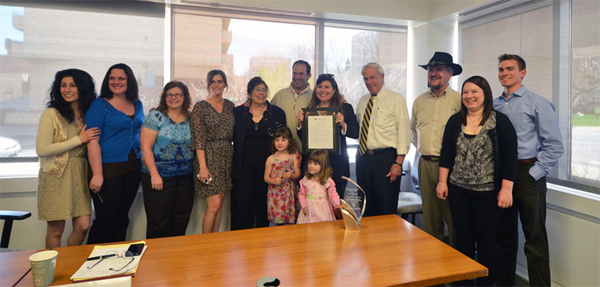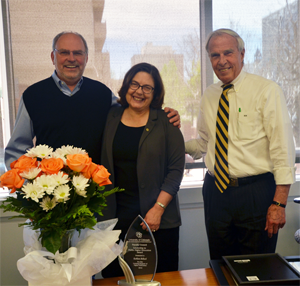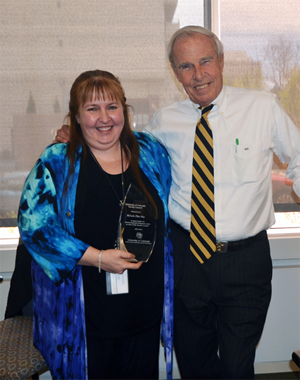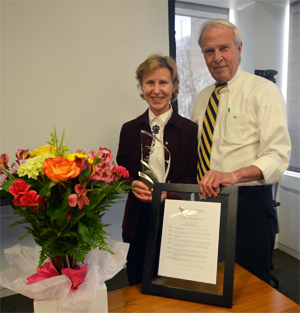Bollard, Laird, Kelly-Bowry receive honors from Faculty Council
Tanya Kelly-Bowry is joined by members of her family, the Government Relations team and CU President Bruce Benson for last week's award presentation. (Photo: Cathy Beuten)
Three special awards recognizing exemplary leadership and service were handed out by the University of Colorado’s Faculty Council during its April 24 meeting at 1800 Grant St.
Kathleen Bollard, with her husband, David Click, is congratulated by President Benson. (Photo: Cathy Beuten)
Kathleen Bollard, vice president of academic affairs and professor of Spanish, received the Leadership in Public Higher Education Award, in part, for her work with stakeholders developing policies that benefit the state, the CU community and students.
Bollard has been a CU faculty member for 19 years. The Faculty Council award resolution stated that Bollard was recognized for the “quality and integrity of her commitment to faculty rights and responsibilities,” and for using her knowledge of legislative and regulatory processes toward the betterment of all higher educators, the regents and campus administrators.
“It has been such an extraordinary privilege to work with the faculty,” she said. “It’s been the most fulfilling part of this job. I’ve met with people from all over the country from different systems and the model of shared governance we have here and the collaborative way that administration, faculty and staff all work together for the university and the best interest of students is really extraordinary. It’s really unusual and something I think we should all treasure.”
Melinda Piket-May, chair of Faculty Council, said the leadership award only has been given out twice before – to former CU presidents Betsy Hoffman and Hank Brown. “It’s a very special award and it means a lot to us to give out the award this year,” she said.
Pam Laird, professor of history at CU Denver, was given the Distinguished Service Award for her commitment to faculty rights and responsibilities and for “acting as a significant force” in improving working conditions for lecturers and instructors. Laird has served as a faculty member for more than 25 years and has been a member of Faculty Council since 2002. She also has served on numerous committees both at CU Denver and systemwide.
“It’s been a great honor to be at CU and I have to say that shared governance is what gives us a chance to make a difference,” Laird said.
Pam Laird, professor of history at CU Denver, receiving the Distinguished Service Award from President Benson. (Photo: Cathy Beuten)
Tanya Kelly-Bowry, vice president of government relations, received the Administrator of the Year Award for serving with distinction to successfully lobby bills to assist the university campuses and their capital construction needs. The Faculty Council resolution honoring Kelly-Bowry, who has worked at the university for 16 years, pointed out that she has cultivated and built relationships with hundreds of legislators and policy leaders at both the state and federal level and has “gained the confidence and respect of the faculty while serving the best interests of faculty, staff and students.”
Her family and government relations staff looked on as Kelly-Bowry, clearly touched by the honor, received the award.
“I’ve received a lot of awards, but this one is so meaningful because you are the ones who have kept us together when state money has gone down and federal funds have dried up,” she said. “This is one of the highest honors I have ever received, and I’m very grateful to the faculty for all of the incredible work you all do.”
The council also recognized Piket-May, whose term as chair of the organization is ending. Borgelt said Piket-May has been appreciated during the past two years for the way she has strived to “do the right thing and respond in a way that captures all of the stakeholders” while advocating for faculty in a positive way.
In other business during the Faculty Council-Faculty Senate meeting:
- Faculty Council elected officers for the coming term. Those who will serve in officer positions are: chair, Laura Borgelt; vice chair, Julaine Field; and secretary, Peggy Jobe.
- E. Jill Pollock, vice president for employee and information services, told faculty members that the university is reviewing current retirement plans offered by the university. Currently, there are three vendors for the university’s 401A plan, which is funded by both participants and CU; a second, optional plan -- 403B – has eight vendors. The university is in the process of assessing the plans to determine whether fewer vendors would be more cost-efficient; plan participants will be asked for input as the process moves along.Any changes would have minimal effects on enrollees, Pollock said. If a certain plan is no longer available, participants will be notified and will have the choice of leaving their money with that plan, picking another plan, rolling the funds over, or placing the funds into an IRA. She said participants of the eliminated plan would no longer be able to contribute to that plan through a tax-deferred payroll deduction.
- Piket-May gave council members an update on the issue of presidential succession. She said some regents feel that the best way to handle succession is for the chair of the Board of Regents to appoint one of the university’s vice presidents or chancellors to the role should the president be unable to fulfill his duties.Currently, the policy states that the vice president of academic affairs would become interim president until the board was able to appoint someone.Piket-May also informed faculty council that a faculty representative will be part of all vice presidential searches. A recently proposed change to university policy stipulated that Faculty Council would only have representation on a search committee for the vice president of academic affairs; however, that language now has been revised.
- President Bruce Benson gave a report on the state of the university. He said pending legislation, HB 14-1319, which ties some state funding to higher education institutions based on performance metrics, is of concern to the university and several other colleges. The legislation, proposed by House Speaker Mark Ferrandino, D-Denver, has been revised several times, and is likely to be revised further as it moves through the legislative process.Benson said the system has been making progress in several areas that were targeted for improvement. Once of those is a revamp of the CU Foundation and revising ways in which the university raises money. Benson said the university should be raising three times the amount of money it now receives from donors.He also said he believes in “discussion and debate” and wants to continue to attract conservative scholars to the university. He said that three more MOOCs (Massive Open Online Courses) are on the launching pad; currently six courses are available and nearly 190,000 people have signed up for those courses.Because he believes state funding for higher education likely will run dry in less than a decade, Benson said the university is developing a marketing plan to better showcase university research and programs in order to increase revenue sources. He pointed to the recently announced Center for Personalized Medicine and Biomedical Informatics on the Anschutz Medical Campus as one area that places the university among the nation’s elite institutions.Other positives, he said, include the revamped Boulder athletics department, the expansion of class offerings in south Denver in an 11,000-square-foot area at the Wildlife Experience, and continued construction and revitalization on all campuses.





